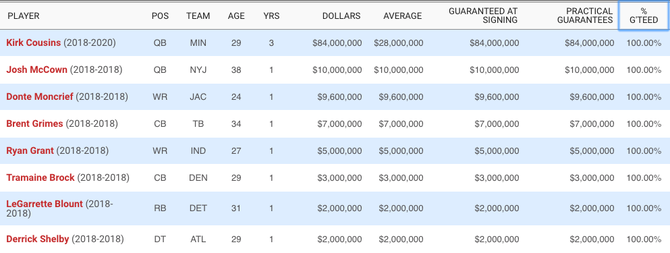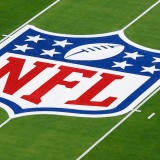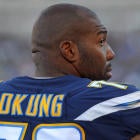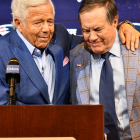Pretty much every time an NFL player signs a new contract, you will often see interested league observers tell you that the contract is not actually worth the reported dollar value. That's because a significant portion of NFL contracts are not guaranteed.
The real value of a player's contract is his guaranteed cash flow; but the number that comes out first is often the absolute maximum a player can earn, rather than what he will earn regardless of performance and/or injury issues that arise down the line.
On this front, Kirk Cousins may have shifted the market in an interesting direction this offseason. Cousins signed a three-year contract with the Vikings that will pay him $84 million -- every single penny of it fully guaranteed. It is extraordinarily rare for a veteran player to receive a 100 percent guaranteed contract. In fact, according to the contract tracking site Spotrac.com, Cousins is the only active veteran in the league on a multi-year deal that is 100 percent guaranteed.

The reason NFL contracts are structured this way is largely because that's the way it has always been done. If Chargers left tackle Russell Okung gets his way, however, unguaranteed contracts will become a thing of the past as soon as 2020, when the current collective bargaining agreement expires.
Okung made an impassioned Twitter argument about guaranteed contracts on Tuesday, noting that it will be up to the NFLPA to insist on making fully guaranteed contracts a negotiating point in the next round of CBA negotiations.
(NFL GUARANTEED MONEY THREAD)
— Russell Okung (@RussellOkung) July 3, 2018
I will never understand how billionaire team owners have convinced the public that the players, who put their bodies on the line every week and make less than 50% of league revenue, are the “ungrateful” ones.
Considering football’s level of brute, immanent physicality, high turnover as well as the short life cycle of its participants, it would seem to me that NFL players are in the most need of fully guaranteed contracts.
— Russell Okung (@RussellOkung) July 3, 2018
Many argue that trying to compare the league-player dynamic in the NFL with other sports is apples to oranges. Yes & no. League revenues are skyrocketing, a monster media rights deal is on the horizon, the business of football will never be the same.
— Russell Okung (@RussellOkung) July 3, 2018
It’s up to us, the players, to decide if we want league ownership to finally respect us as partners. Truth is, there is NOTHING preventing agents from negotiating a fully guaranteed salary for an NFL player (see Kirk Cousins deal).
— Russell Okung (@RussellOkung) July 3, 2018
Only problem is that this rarely happens... BUT it doesn’t have to be this way...
— Russell Okung (@RussellOkung) July 3, 2018
Players want guaranteed money? Great! Rewrite the CBA. That’s right, we need an overhaul not a revision or an extension. Why?
— Russell Okung (@RussellOkung) July 3, 2018
For starters: the current CBA uses an antiquated revenue accounting method and salary cap rules take up a significant part of our collective bargaining agreement.
— Russell Okung (@RussellOkung) July 3, 2018
Salary caps 👏🏾don’t 👏🏾help 👏🏾players!!
— Russell Okung (@RussellOkung) July 3, 2018
Moving on.
Of course, Okung also noted that the NFLPA is likely to meet significant resistance from the owners if it insists on making contracts guaranteed. The owners have major incentive to continue the system as is -- they are essentially printing money right now and they share less than half of it with the players, whom their teams can often cut ties with at a moment's notice with little to financial penalty. That's a pretty favorable system for ownership.
Let Okung explain.
One part of ownership’s reluctance to give players guaranteed money is the structure of our cap system, the “cap” consists of an intricate series of accounting rules that does not fully reflect actual transfers to the pockets of players.
— Russell Okung (@RussellOkung) July 3, 2018
Historically, the league has done a masterful job inserting language into the CBA to justify getting out of a “guarantee” or contract. Most headlines on the first day NFL free agency are misleading, even for players who are household names.
— Russell Okung (@RussellOkung) July 3, 2018
Superlatives attached to “highest paid player” is good for the media, but leaves many players wanting regarding actual cash by the finality of their deals. Press is nice but cash is better, especially with risk associated with our line of work.
— Russell Okung (@RussellOkung) July 3, 2018
It’s only fair that a player sign a contract and expect the other side to honor that, right? What ever happened to “Show me the money?” pic.twitter.com/rkLDXiQKvM
— Russell Okung (@RussellOkung) July 3, 2018
Okung continued to another subject that affects how much players can be compensated: dead money.
I’ll continue... consider guaranteed money in our current system. Fractions of a team’s cap can be exhausted or locked in by what’s known as “dead money” or a payout to a player because of the form of guarantee...
— Russell Okung (@RussellOkung) July 3, 2018
at the time of signing, thus limiting the amount teams are willing to guarantee. The “funding rule” gives management the flexibility to tell a player they are SOL.
— Russell Okung (@RussellOkung) July 3, 2018
This rule had more of a purpose in the past as their were issues with owners making payroll but with billionaires clamoring to be owners and the bids of media rights being north of two billion, is this rule still relevant?
— Russell Okung (@RussellOkung) July 3, 2018
During the 2017 season, NFL teams combined for an incredible $501,175,192 in dead money charges on their books -- just south of 10 percent of the league's entire salary cap outlay, which checked in at nearly $5.2 billion. Without those roster charges, there would have been significantly more money available with which to pay free agents and other veteran players.
There's only one way to change this system, according to Okung.
With all that said, there are additional judgments to make regarding plenty of legal language in the CBA that works toward the detriment of players and in favor of multi-billionaire owners. If players want change, demand it. 💯💯
— Russell Okung (@RussellOkung) July 3, 2018
We'll just have to wait until 2020 to find out if the players take his advice.






















